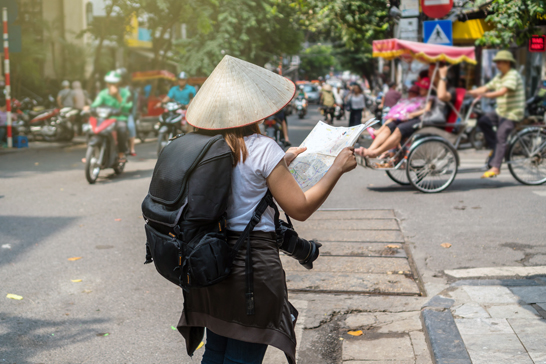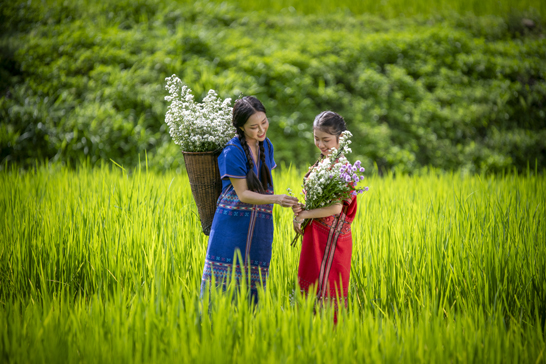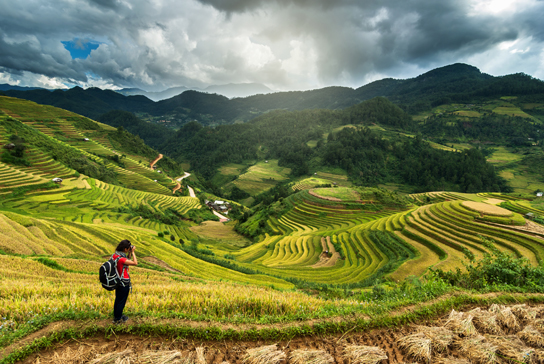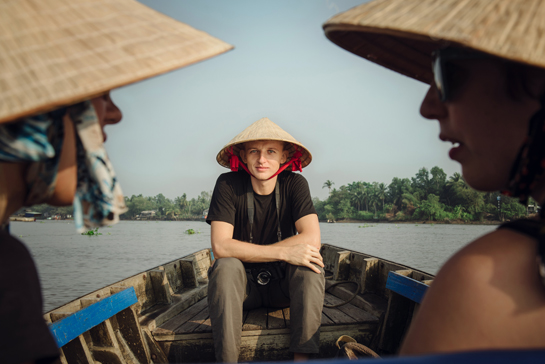Discover how living in Vietnam offers an unparalleled combination of stunning landscapes, rich culture, and remarkable affordability, allowing you to experience a life of luxury on just $500 a month.
Read more: Living in Vietnam: The Ultimate Guide to Affordable Luxury in 2025Why Living in Vietnam is a Game-Changer in 2025
Vietnam has undergone an extraordinary metamorphosis over recent decades. Once primarily known for its turbulent history, today’s Vietnam stands as one of Asia’s most dynamic and vibrant nations. This Southeast Asian gem has successfully blended its rich cultural heritage with modern innovation, creating an environment that’s both deeply traditional and surprisingly contemporary.
For travelers, digital nomads, retirees, and adventure-seekers, living in Vietnam represents an opportunity to experience luxury at a fraction of Western costs. With just $500 monthly, you can access a lifestyle that would cost thousands elsewhere—complete with modern amenities, exceptional cuisine, and unforgettable experiences. The value proposition of living in Vietnam has never been stronger than in 2025.
Why Vietnam Stands Out in Southeast Asia
Breathtaking Geographic Diversity
Vietnam’s geography spans over 1,600 kilometers along the eastern edge of the Indochinese Peninsula, offering an incredible variety of landscapes and climates to suit any preference:
- Mountain Retreats: Da Lat, the “City of Eternal Spring,” provides cool temperatures between 15°C and 25°C year-round, perfect for those who prefer milder weather.
- Coastal Paradise: Cities like Nha Trang boast pristine beaches with crystal-clear waters and vibrant marine ecosystems, ideal for snorkeling enthusiasts and beach lovers.
- Urban Centers: From the old-world charm of Hanoi to the cosmopolitan energy of Ho Chi Minh City, Vietnam’s major cities offer distinct flavors of urban living.
Strategic Location
Vietnam’s position makes it a perfect base for exploring Southeast Asia. Short, affordable flights can take you to neighboring countries like:
- Cambodia
- Laos
- Thailand
- Malaysia
This connectivity adds tremendous value for those who enjoy frequent travel and new experiences.
Cultural Richness and Diversity
With nearly 100 million people calling Vietnam home, the country boasts remarkable cultural diversity. While the Kinh (Viet) people make up about 86% of the population, Vietnam recognizes 53 ethnic minority groups, each with distinct traditions, languages, and customs.
This cultural tapestry creates opportunities for immersive experiences:
- Exploring tribal markets in Sapa
- Staying in homestays with Tay or Hmong communities
- Learning traditional crafts from local artisans
- Participating in regional festivals and celebrations
The Daily Experience of Living in Vietnam: What to Expect

Language and Communication
While English proficiency is growing, especially in tourist areas and among younger Vietnamese, learning basic Vietnamese phrases can significantly enhance your experience. Simple greetings like “Xin chào” (hello) and “Cảm ơn” (thank you) can open doors to warmer, more authentic interactions.
Coffee Culture
Vietnamese coffee deserves its legendary status. The signature ca phe sua da—strong black coffee brewed over sweetened condensed milk and served with ice—offers a perfect morning ritual that quickly becomes a cherished part of daily life. Local cafés range from traditional sidewalk setups to modern, air-conditioned establishments, all serving exceptional coffee at remarkably low prices.
Culinary Delights
Vietnamese cuisine stands among the world’s finest, emphasizing fresh ingredients, vibrant herbs, and balanced flavors. Street food provides affordable yet unforgettable meals:
- Pho: Fragrant beef or chicken noodle soup
- Banh Mi: Crusty baguettes filled with meats, pâté, and fresh vegetables
- Bun Cha: Grilled pork with rice noodles
- Fresh Spring Rolls: Delicate rice paper rolls with herbs and protein
Most street food meals cost between $1-2 USD, making dining out a daily pleasure rather than an occasional splurge.
Living in Vietnam’s Major Cities
Living in Hanoi means embracing old-world charm with its:
- Narrow, winding alleys
- French colonial architecture
- Tranquil lakes and green spaces
- Traditional markets
- Historical sites
Daily life moves at a more measured pace in Hanoi, allowing residents to appreciate the city’s centuries of heritage. The Old Quarter offers a fascinating maze of streets named for the goods once sold there, from silver to silk to medicinal herbs. Many expats find that living in Hanoi provides a deeper connection to Vietnamese traditions.
Ho Chi Minh City: The Dynamic Metropolis
Living in Ho Chi Minh City (formerly Saigon) means immersing yourself in energy and ambition:
- Modern skyscrapers and shopping centers
- Vibrant nightlife
- International restaurants
- Technology hubs
- Entrepreneurial spirit
This southern hub offers a more cosmopolitan lifestyle, with countless cafés, coworking spaces, and entertainment options catering to both locals and expats. For those seeking a faster pace while living in Vietnam, Ho Chi Minh City delivers excitement around every corner.
Building Relationships in Vietnam

Understanding Vietnamese Values
Family forms the core of Vietnamese society, with multigenerational households common and deep respect for elders a fundamental value. This reverence extends to all relationships, including those with foreigners.
Vietnamese Women
Vietnamese women play vital roles in both family and society, balancing traditional values with modern aspirations. Known for their resilience, grace, and strong sense of responsibility, they often serve as the emotional and practical centers of households. In urban areas particularly, increasing numbers of women pursue higher education and professional careers while maintaining cultural connections.
For those building personal or romantic relationships, approaching interactions with respect and cultural sensitivity is essential. Values like politeness, humility, and family orientation remain important in social contexts.
Intercultural Connections
Many foreigners find themselves warmly welcomed into Vietnamese families and communities. While cultural differences may require patience and understanding to navigate, the rewards include deep, meaningful connections based on mutual respect and genuine curiosity.
The Remarkable Affordability of Vietnam
Housing Costs
Accommodation varies significantly by location but remains incredibly affordable by Western standards:
- Budget apartments: $150-250/month
- Mid-range apartments: $300-500/month
- Luxury options: $500-1000/month
Smaller towns and cities offer the best value, while prime locations in major urban centers command higher prices.
Transportation
Getting around in Vietnam is both convenient and economical:
- Motorbike rental: $40-60/month
- Grab rides (similar to Uber): $1-3 for most city trips
- Public buses: $0.25-0.50 per journey
Many expats purchase their own motorbikes for about $300-800, providing maximum freedom to explore.
Daily Expenses
Your $500 monthly budget stretches remarkably far:
- Food: $150-200 (including occasional restaurants)
- Utilities: $50-70 (electricity, water, internet)
- Transportation: $50-70
- Entertainment: $100-150
- Miscellaneous: $50-100
This leaves room for savings or occasional splurges on luxury experiences like spa treatments or weekend getaways.
Leisure and Recreation in Vietnam

Natural Wonders
Vietnam’s landscape offers endless exploration opportunities:
- Ha Long Bay: UNESCO World Heritage Site with emerald waters and limestone karsts
- Phong Nha-Ke Bang National Park: Home to some of the world’s largest caves
- Ba Be Lake: Tranquil waters surrounded by limestone mountains
- Con Dao Islands: Pristine beaches and exceptional marine life
Outdoor Adventures
Adventure enthusiasts find paradise in Vietnam’s diverse terrain:
- Trekking: Explore terraced rice fields and ethnic minority villages in Sapa
- Diving and Snorkeling: Discover vibrant coral reefs around Con Dao or Nha Trang
- Motorbiking: Experience the legendary Hai Van Pass or historic Ho Chi Minh Trail
- Kayaking: Navigate the limestone formations of Ha Long Bay or Cat Ba Island
Golf and Leisure
Vietnam has emerged as a premier golfing destination with world-class courses designed by legends like Greg Norman and Nick Faldo. Green fees cost a fraction of Western prices, making regular play accessible on even modest budgets.
Beyond golf, leisure options abound:
- Relaxing at rooftop bars and cafés
- Exploring vibrant night markets
- Taking cooking classes
- Enjoying traditional performances
Practical Considerations for Living in Vietnam

Visa Options
Most tourists can enter Vietnam visa-free for up to 15 days, but longer stays require proper documentation:
- Tourist visas: Available for 1-3 months
- Business visas: For those working with local companies
- Temporary residence cards: For long-term stays
Recent visa reforms have made extending stays easier, though regulations change periodically.
Healthcare
Healthcare in major cities meets international standards at significantly lower costs:
- International hospitals: Facilities like FV Hospital in Ho Chi Minh City offer Western-standard care
- Local clinics: Provide quality basic services at very affordable rates
- Health insurance: International coverage recommended, with local plans available
A typical doctor’s visit might cost $20-50, compared to hundreds in the US.
Safety and Security
Vietnam boasts low crime rates and generally safe neighborhoods. The biggest safety concern is typically traffic, which requires awareness and caution, especially for newcomers.
Is Living in Vietnam Right for You?
Living in Vietnam offers an extraordinary combination of affordability, cultural richness, natural beauty, and modern amenities. With just $500 monthly, you can enjoy experiences that would cost ten times as much in Western countries.
Whether you’re looking to retire early, work remotely, or simply experience a different way of life, living in Vietnam provides the perfect backdrop for creating your ideal lifestyle. The warmth of its people, the diversity of its landscapes, and the depth of its cultural traditions create an environment where every day brings new discoveries.
As Vietnam continues to develop while preserving its unique character, 2025 represents the perfect time to explore all that living in Vietnam has to offer.
Have you experienced life in Vietnam or are you considering a move? Share your thoughts and questions in the comments below!
FAQ About Living in Vietnam
Q: Is it safe for foreigners living in Vietnam?
A: Yes, Vietnam has low crime rates and is generally very safe for foreigners. The main safety concern is traffic, which requires caution and awareness when living in Vietnam long-term.
Q: Do I need to learn Vietnamese to live comfortably?
A: While learning basic Vietnamese phrases is helpful and appreciated by locals, you can get by with English in most tourist areas and major cities, especially among younger Vietnamese. However, learning the language enhances the experience of living in Vietnam.
Q: What’s the best city in Vietnam for expats?
A: It depends on your preferences when living in Vietnam. Ho Chi Minh City offers more job opportunities and a cosmopolitan atmosphere, while Hanoi provides deeper cultural immersion. Da Nang and Hoi An offer beachside living with growing expat communities.
Q: How reliable is the internet in Vietnam for digital nomads?
A: Internet service for those living in Vietnam is generally good in urban areas, with fiber connections widely available. Speeds are sufficient for remote work, including video calls and data-intensive tasks.
Q: What healthcare options exist for expats living in Vietnam?
A: Major cities have international hospitals and clinics with English-speaking staff. Health insurance is recommended for anyone living in Vietnam, with both local and international options available at reasonable rates.Discover how living in Vietnam offers an unparalleled combination of stunning landscapes, rich culture, and remarkable affordability, allowing you to experience a life of luxury on just $500 a month.


